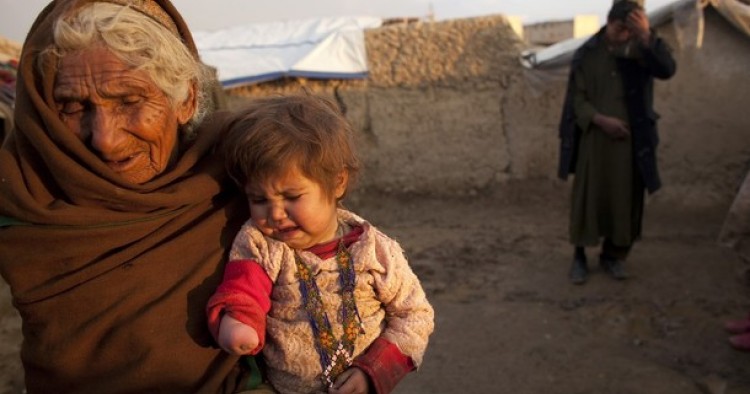Originally posted December 2012
Impunity has a long history in Afghanistan. Over a century ago, King Amir Abdur Rahman massacred the Hazaras and Uzbeks of Afghanistan and confiscated their property. But in return, he was honored as the founder of the new Afghanistan. King Zahir, who during his 40-year rule did little to develop Afghanistan, is celebrated as “the Father of the Nation.” The mujahidin who, in Kabul alone, murdered nearly 60,000 civilians were honored as Afghanistan “freedom fighters,” while the Communists who were indiscriminately killing civilians were considered a “peoples’ party”(Hizb Khalq). Mullah Omar, the leader of the Taliban, whose suicide bombings killed worshipers in mosques, earned the title of “Leader of the Faithful.” Tragically for the Afghan people, this pattern continues.
Impunity Prevails
December 10, Human Rights Day, is celebrated each year throughout the world to honor the Universal Declaration of Human Rights (UDHR). On that day in 2006, after approving the Transitional Justice Action Plan, President Hamid Karzai proclaimed December 10 “War Victims Day” in Afghanistan. The same day, the President, while watching a documentary on the human cost of war, shed tears and expressed his deep concerns and sympathy for the victims.[1]
Exactly a year later, while commemorating the victims, the President acknowledged his inability to take decisive action against suspects of war crimes, stating, “The government of Afghanistan is not able to punish the war criminals and violators of human rights.”[2] In this meeting, he also linked past criminal suspects to foreigners.
However, during the first press conference following his reelection, the President — regarding the presence of the suspects in the new government — stated, “Afghans have been labeled in different ways, but today is not the time to repeat old issues. Afghans are not going to be deceived by foreigners anymore, since these issues cause a split.” [3]
The conduct of the Afghan Parliament, or “house of the people,” tells a similar story. On January 31, 2007, Parliament approved a bill titled “the National Reconciliation Manifesto,” which declared general impunity for all suspects of past war crimes. Meanwhile, the country’s judicial branch suffers from poor professional capacity, widespread corruption, and the lack of independence.
In Helmand — one of Afghanistan’s troubled provinces — an assailant attacked a local commander named “Khano,” killing him and 23 civilians. Subsequent investigations showed that the attacker had filed a suit against Commander Khano, but had resorted to violence due to the lack of access to justice.[4] The case of Commander Khano is not an exception. Tracking most of the many cases of insecurity in the country leads us to facts similar to those of the Commander Khano case.
The Cost of Impunity
A survey conducted by the Afghanistan Independent Human Rights Commission regarding the implementation of justice on past crimes showed that 86.8% of the population supports securing justice, 76.4% of the population thinks that prosecuting the criminals results in an improvement of security, and 90% want perpetrators of human rights to be removed from government posts.[5] Ignoring the demands of such an overwhelming majority of the population inevitably will result in their disaffection from the government. Such popular disaffection, in turn, is likely to cause an upsurge in vigilantism resembling the Khano case. The fact that most major past criminal suspects occupy high-level government posts merely compounds this problem.
Impunity is prevalent not just with respect to war criminal suspects but for suspects of all crimes, including members of the most dangerous narcotics smuggling mafia, kidnappers, and corrupt high-level government officials. Impunity in Afghanistan is like an unwritten law which benefits the wealthiest and most powerful criminals.
Impunity is the avoidance of justice, which lies at the heart of security. Indeed, security without justice is very fragile. On the other hand, securing justice is an essential element of securing peace and stability. Thus, there exists a direct link between impunity, justice, and security. It is highly unlikely that peace can be achieved by ignoring the desire of 86.8% of the Afghan population for justice.
Impunity also encourages the commission of more crimes. When criminals of any type are not prosecuted, this usually results in the repetition and increased level of crime. As we know very well, most organized criminals or insurgents have criminal records. Declaring general impunity or introducing impunity-based policies for powerful criminals has a direct, negative impact on stability.
A Cruel Joke
There is a joke that goes: “One who kills two persons is imprisoned, one who kills 200 people is sent to the madhouse, and one who kills 20,000 people is invited to the peace conference.” Unfortunately, Afghanistan is a good example of such an unpleasant joke, for those who brought about human insecurity are security providers, those who were infamous for breaching laws are the law-makers, those who were notorious thieves are now keepers of the treasury, those who were accused of massacring people are their representatives, and those who were accused of destroying the capital city are considered national heroes.
[1]. Abdul Jalil Benish, “Only Shedding Tears is Not Enough,” December 23, 2006, http://www.watchafghanistan.org.
[3]. The Truth, An Afghan Monitoring Bi-weekly Newsletter, Issue 8, October 30, 2009, http://www.watchafghanistan.org.
[4]. Abdul Jalil Benish, “Transitional Justice in Afghanistan: End or New Beginning?” February 20, 2007, http://www.watchafghanistan.org.
[5]. AIHRC, “Call for Justice,” January 29, 2005, http://www.aihrc.com.af.
The Middle East Institute (MEI) is an independent, non-partisan, non-for-profit, educational organization. It does not engage in advocacy and its scholars’ opinions are their own. MEI welcomes financial donations, but retains sole editorial control over its work and its publications reflect only the authors’ views. For a listing of MEI donors, please click here.













